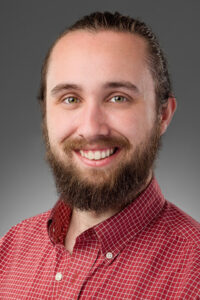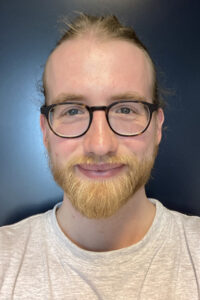New One-U RAI Postdoc Fellows Will Use AI to Address Plastic Waste, Language Gaps in Online Therapy, and Disaster Response

Using AI to Accelerate Solutions to the Plastic Waste Crisis
Philip P. Lampkin
Mentors: Matt Sigman, Jacob Lessard, Taylor Sparks
Thematic Area: Environment
Lampkin’s project aims to address plastic pollution by developing plastics that are “degradable and upcyclable on demand.” He’ll use AI models to accelerate the discovery of special additives that can be built into common, durable plastics—like polystyrene—to safely break them down or transform them into new materials when triggered by light or acid. The project hinges on designing and testing classes of highly reactive chemical compounds and using AI to predict their behavior. To enable the discovery process, Lampkin will create a data-efficient AI algorithm that can identify useful additives more rapidly than conventional trial-and-error experimentation. Data efficiency is crucial because datasets for training AI in many areas of chemistry are sparse due to high experimental costs. “Although this work alone will not solve plastic pollution, it should furnish conceptual and practical advances useful for enhancing the sustainability of plastics,” Lampkin said. “In the short term, my study will generate an innovative AI algorithm that can catalyze molecular discovery campaigns across many domains. In the long term, this project should demonstrate a promising approach for addressing the chemical challenge at the core of the plastic waste crisis.”
Lampkin is currently completing an organic chemistry Ph.D. at the University of Wisconsin–Madison in professor Samuel H. Gellman’s group and expects to start at the University of Utah in January.

Building AI-Powered Mental Health Tools that Work Across Languages
Jens Kristian (JK) Refsgaard Schou
Mentors: Jeff Phillips, Vivek Srikumar, Zac Imel
Thematic Areas: Healthcare and Wellness, Teaching and Learning
AI tools have the potential to improve mental health on a global scale—especially if tools can be leveraged across many languages. Schou, who is Danish, will use text and video data from online therapy in his home country to study how AI models originally trained in English can be adapted to a less-common language without erasing nuance. “Danish is an ideal gateway for studying how to adapt AI models to underrepresented linguistic and cultural contexts: it is underrepresented in large models, yet supported by a growing national AI infrastructure,” Schou said, citing national investments such as Gefion, one of the most powerful supercomputers in the world. All data will remain in Denmark and be used only with informed consent. Schou will use AI-driven algorithms to responsibly support therapists in crafting therapeutic messages and detecting early signs of patient disengagement, without compromising clinical intent. The same models could also be used as learning tools in supervised training environments, supporting AI-powered instruction for mental health professionals. “By adapting these tools to low-resource languages, the project also promotes broader access and inclusion in therapist education,” Schou said.
The University of Utah, Schou said, offers an “ideal environment” for his proposed project because of its leading researchers in natural language processing, psychotherapy-AI integration, and data science. Schou is completing his computer science Ph.D. at Aarhus University in Denmark and expects to start at the U in November.

Beyond the Emergency: AI for Long-Term Recovery from Disasters
Di Wang
Mentors: Divya Chandrasekhar, Tom Cova, Tolga Tasdizen, Marina Kogan
Thematic Area: Environment
As climate-related hazards become more frequent and severe, people leading recovery efforts need to make informed decisions long after the emergency itself. Southern California and Western North Carolina, for example, continue to rebuild months after the Palisades Fire and Hurricane Helene, respectively. While AI research has largely focused on immediate response, post-disaster recovery—key to long-term community resilience—remains understudied. Wang’s project will bridge this gap by developing AI methods to analyze diverse data sources. Specifically, he will integrate social media data, geolocated imagery, mobility data, field observations, and official disaster reports to understand how communities navigate the complex and extended phases of recovery. He’ll identify major recovery benchmarks and disparities in aid distribution across communities. “With mentorship from faculty members in disaster recovery, computer vision, and crisis informatics, this project brings together advanced analytical approaches and practical insight to ensure the research maintains methodological integrity while addressing real-world recovery challenges,” Wang said. “My long-term goal is to build AI systems that respond to the evolving needs and challenges in disaster response and recovery—helping communities make informed decisions, meet changing needs, and rebuild more equitably.”
Wang earned his computer science Ph.D. from the U in 2024. Since then, he has worked as a postdoctoral fellow with Matthew Flatt. He’ll begin his new postdoctoral fellowship in July.
The University of Utah One-U Responsible AI Initiative (One-U RAI) postdoctoral fellowship covers salary and benefits, including retirement, for two years. One-U RAI expects to award three to five postdoctoral fellowships each year and accepts applications every six months. Read more about postdoctoral fellowships.
